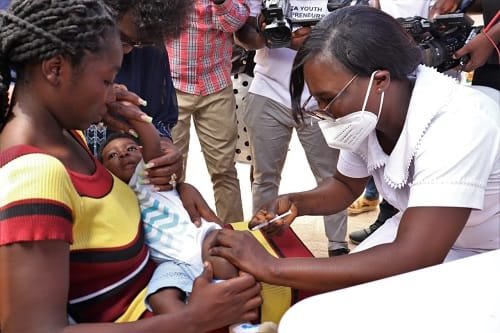
Ehanire
By Gom Mirian
Nigeria’s Federal Government says over 4,000 Primary Health Care facilities of the 10,000 earmarked for revitalization across the country have been revitalized.
Minister of Health, Dr. Osagie Ehanire, disclosed this on Thursday at the commemoration of World Health Day and World Health Workers Week, in Abuja.
The theme of the 2023 World Health Day is “Health for All – Strengthening PHC to Build Resilient Systems”, while the theme of the World Health Workers Week is “Investing in the Health Work Force”.
Dr. Ehanire said that the revitalization had improved primary healthcare services in Nigeria and reduced challenges women face in childbirth and addressing home emergencies.
Speaking on COVID-19, he said, Nigeria must achieve at least 70% vaccine coverage to have strong herd immunity against the COVID-19 virus.
According to him, the government, in a bid to reverse poor health indices and provide Universal Health Coverage initiated the revitalization of about 10,000 primary healthcare centres nationwide, exemplified by the revitalized Kuchigoro PHC in FCT.
He said more than 4,000 PHCs have been revitalized so far, while working towards a new PHC model equipped with staff quarters, solar power, and assured potable water supply, to enable 24/7 service provision to citizens.
Adding that these steps have improved primary healthcare services in Nigeria and reduced challenges women face in childbirth and addressing home emergencies.
“The Basic Health Provision Fund (BHCPF) was established by the
“National Health Act (2014) to provide and finance essential health services that address our poor health indices at Primary Health centres, to poor and vulnerable citizens, especially in rural areas, on our path to Universal Health Coverage.
“The effort includes the provision of emergency medical services with a rural Ambulance System (RAS) under a National Emergency Medical Service and Ambulance System (NEMSAS).
“The Federal Government (FGoN) through National Primary Health Care services has as of 1st April 2023; fully vaccinated 71,477,351 Nigeria residents with COVID-19 vaccines representing 61.6% of the targeted eligible population and another 82,474,931 people have received at least one dose of the vaccine.
“The Country is still implementing the SCALES 3.0 strategy using Johnson and Johnson Covid-19 vaccine until we achieve at least 70% coverage needed for strong herd immunity against the COVID-19 virus,” said Ehnaire.
While on polio, he said, “Nigeria has remained free of wild poliovirus (WPV) which led to WPV certification of the African region in August 2020.
He said in the past six years, there has been no WPV found in Nigeria; a feat backed by a robust and efficient surveillance system, which supports empirical evidence that the wild poliovirus has been interrupted in the country.
He added that Nigeria’s immunization profile had recorded a significant improvement.
Also speaking at the meeting, the United Nations Population Fund, UNFPA, Resident Representative Ulla Mueller, in her goodwill message lamented continuous increase in maternal deaths not only due to unavailability of health services, inaccessible, unaffordable, or poor quality care but also due to lack of or inadequate human resources at the PHC levels both in numbers and skills mix.
UFPA, therefore, reaffirms its strong commitment to assisting Nigeria to build a resilient and stronger Health System that upholds the rights of all people to reach the highest possible standard of health through support to Human Resources for Health development.
Meanwhile, the World Health Organization, (WHO) Regional Director for Africa, Dr. Matshidiso Moeti, in his message, lamented the lack of access to much-needed health care in the region.
“About half of Africa’s citizens (48%) – some 672 million people – still do not have access to the health care they need.
“These results from weak health systems characterized by inadequate health infrastructure; poorly designed policies to limit financial barriers to health services; shortage of qualified health workers; inadequate access to quality medicines, medical products, and innovative technologies”.
But despite this setback, she said there have been some achievements like Smallpox, which claimed an estimated 300 million lives in the 20th century alone, has been eradicated. Since 1974, millions of children have received life-saving vaccines and other child survival interventions.


